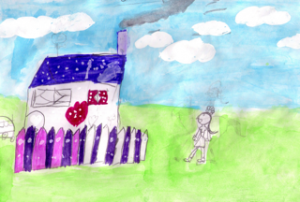Coca-Cola was the subject of my first stab at writing when I was a fourth or fifth grader at Brentwood Elementary School in West L.A. I based the story on Jack and the Beanstalk. My main character, a boy like Jack, climbed up the beanstalk and found a giant hoarding a wealth of Coca-Cola. Back in those days, soft drinks were a rarity in my house. Us five kids were allowed only one glass when we were out for a family dinner at Denny’s or Andersen’s Pea Soup on road trips to Big Sur or Sequoia National Park. We nursed them. The hero of my story managed to steal magic beans from the giant and took them home to make his own soft drinks, all for free, all for his own guzzling. Soon he had gallons and gallons of the syrupy cola, so much that he became wealthy on the sales around town of what he couldn’t drink himself. But soon his friends turned against him and he got lonely. So he dumped his wealth and returned to a happier life of nursing a cola on special occasions.
I remembered the story this week while speaking to fifth- and sixth-graders at Colegio Aletheia in Buenos Aires. A friend, who is a teacher there, invited me to read a story of mine to them and answer questions.
I accepted.
When I got there I realized I’d never read to such a large group, only a writing group of peers. And my children. Never a small auditorium of bright and enthusiastic kids who thought I was famous and may drive a flashy car and have hobnobbed with Roald Dahl.
I read Road Kill, a story that first appeared on this blog and then self-published on Fictionaut – and now live at Aletheia.
The kids listened. Some fidgeted. I think they liked it. They asked many questions, some prepared and others off the tops of their heads, born out of enthusiasm, I came to believe, for writing and telling stories. And for reading Lord of the Rings, The Lion, The Witch and the Wardrobe and any number of Roald Dahl classics.
At the end, they asked for advice on writing their own stories, a project in the works. I said to write whatever comes to your mind without questioning its logic or sense or senselessness. Let your imagination run wild. That’s what I did when I made my start with the Coca-Cola story. Those were beautiful days, when the world lay before me and I could write about any adventure even if nonsensical. I didn’t know much about the craft of writing. That would come later. It began with passion, passion to write stories, stories about, maybe, a boy who wants to play football but his government has outlawed balls. Or maybe a story about three boys who innocently start a fire in a field to find it turns to a blaze and they must choose to escape offense or help put it out.
The students listened and they looked eager to tell their own stories, to write with passion and fear and enjoyment and horror, to write with indignation and love. That’s how I started out, and while I may not be known today by any standards I still write with the same fervor because I cannot stop. I have to write. Writing for me is like Ray Bradbury writes in his book Zen in the Art of Writing:
“Not to write, for many of us, is to die.”
Everybody has his own story, her own passion that may come out in a story, in a painting, in the design of a house, or in fancy footwork on the pitch or in the waves.
“Yell. Jump. Play. Out-run those sons-of-bitches. They’ll never live the way you live. Go do it,” writes Bradbury.
Dream and race to write it all down. What if dragonflies attacked and flew you off with your house and all? What if you discovered it’s not blood that’s coursing through your veins? What if you built a killer tree house connected by a bridge to your house in a forest where you could race through the trees on zip lines.
Shakespeare wrote masterpieces beyond imagination. But my imagination is mine. It’s different. That’s what I hoped to communicate to the kids in the auditorium to drive them to go wild, dream, invent, play and enjoy.
I hope they got my drift.





